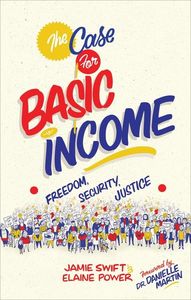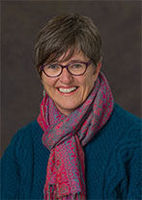Now More Than Ever: Jamie Swift and Elaine Power Make the Case for a Universal Basic Income
A universal basic income isn't a new idea, and there are mountains of evidence to support its efficacy, including studies showing that individuals receiving basic incomes are able to contribute more to the workforce and economy and require less overall support. So why hasn't the idea been widely implemented?
Enter acclaimed nonfiction author Jamie Swift and Queen's University Professor Elaine Power, whose The Case for Basic Income: Freedom, Security, Justice (Between the Lines Books) examines the nitty-gritty of the basic income model, ideological resistance across the political spectrum, and why the time is now to overcome those factions.
It's a radical proposal but Swift and Power's clarity and frankness make a great case, especially in the wake of COVID-19. The effects of the pandemic, combined with rising automation and precarious labour, and falling real wages, mean the case for BI has never been more urgent. At its heart, the book is a simple call for equity and fairness, particularly in wealthy countries like Canada.
We're thrilled to welcome Jamie and Elaine to Open Book today to discuss The Case for Basic Income as part of our True Story nonfiction series. They tell us about why basic income is a public health issue, note how they were talking about the rise of precarious labour (aka the gig economy) as far back as 1995, and share a series of Orwell quotes that guided their writing and which also throw the brutality of poverty into sharp relief.
Open Book:
Tell us about your new book and how it came to be. What made you passionate about the subject matter you're exploring?
Elaine Power:
Our new book, The Case for Basic Income: Freedom, Security, Justice, uses stories of participant in the short-lived, prematurely cancelled Ontario Basic Income Pilot to explore the history, politics, and debates around basic income. We feature the lives of real people whose lives were stabilized, improved, and, in some cases, transformed by basic income.
For 15 years, I taught a course to first year Queen’s students, HLTH 101, The Social Determinants of Health, in which income figures prominently as a key determinant of health. For example, having adequate income means you can afford decent housing and healthy food, which are also determinants of health. When I first started teaching the course, the idea of basic income, or a guaranteed annual income, was abstract and hypothetical. But in 2013, Rob Rainer, who started a national campaign for a basic income guarantee, came to do a guest lecture in the class and I became an advocate.
I come to basic income from a public health perspective, knowing the many short-time and life-course effects of poverty. But I see basic income as a fundamental tool in the struggle for a more just and democratic society.
Jamie and I started talking about doing a book on basic income after the Ontario Basic Income Pilot was first announced in the Ontario provincial budget of 2016. We were in the midst of interviews when the premature cancellation was announced.
Jamie Swift:
In 1995 I wrote Wheel of Fortune: Work and Life in the Age of Falling Expectations. That was when it was becoming clear that a fractured, split-level society was taking shape. The book explored the transformed world of work, Canada’s increasingly savage inequalities and the seductive mythology of jobs-for-all. It took the reader into the changing lives of ordinary people struggling with what was called at the time “the new economy,” asking what’s happening to our values as a society. That same year I joined a weekly social justice vigil at Kingston city hall, standing for twenty years in solidarity with victims of poor-bashing governments. Which led me to the Kingston Action Group for a Basic Income Guarantee. Which gave rise to a Basic Income book that takes the reader into the lives of participants in the Ontario Basic Income Pilot project, themselves victims of a government that betrayed its promise to see the Pilot through to its end. So I suppose that The Case for Basic Income has, in its way, been twenty-five years in the making.
Your CanLit News
Subscribe to Open Book’s newsletter to get local book events, literary content, writing tips, and more in your inbox
Open Book:
Is there a question that is central to your book? And if so, is it the same question you were thinking about when you started writing or did it change during the writing process?
EP:
The questions that animate the book are really in the title – what IS the case for basic income? How could basic income contribute to freedom, security, justice? The book brings alive the philosophy and politics of basic income with the real life stories of a few participants.
JS:
The book’s main question: Is a universally available, basic livable income a good idea? The title provides the answer. We argue that Basic Income is a moral imperative in a rich country where millions remain in poverty. That said, this is not a data-heavy book about a particular policy. It is about three other things.
- People and the places they live. The book combines deeply-rooted scholarly understandings with sharp-eyed storytelling. We profile Hamilton and Lindsay people who, however briefly, received a Basic Income. Why they needed it. How they used it. We also profile the two cities, one small, rural, and conservative. The other a faded industrial centre now being transformed into something quite different.
- The politics of a compelling idea. That is, why many across the political spectrum reject Basic Income out of hand, particularly people on the political left. The book also sketches how the push for Basic Income in Canada has gained momentum. Calls for Basic Income are resonating in the public square, particularly since the pandemic arrived.
- The difference between labour and work. We see the book a “provocation to freedom” because it questions the sanctity of paid labour (see seductive mythology, above) while asking what counts as useful, important work. Speculators trading currencies for banks? Marketing wizards selling battery-powered spaghetti twirling forks? Or women – briefly, “heroes” – who laboured through the pandemic, doing taken-for-granted caring work? Mothers and daughters doing unpaid care work in the home?
Open Book:
What was your research process like for this book? Did you encounter anything unexpected while you were researching?
EP:
It took us awhile to figure out how to divide up the work of the book. We travelled to Hamilton and Lindsay numerous times, but by happenstance, Jamie ended up going to Hamilton more than I did, and I travelled more frequently to Lindsay. We attended events in each city, went to museums, did formal interviews, worked to incorporate a sense of “place” in the book to help bring OBIP participants’ stories alive and put them in context. While the book focusses on participants’ stories, we also gained valuable insights into the ways that basic income can enhance community life.
JS:
With respect to the research process, one is often advised in writing workshops that one should write what one knows. We knew we wanted to make the case for Basic Income. But we were still curious about how it might work. That’s what we wanted to know. So, not surprisingly, the research took us into the homes and neighbourhoods of people receiving Basic Income. This kind of writing is a learning process. What makes people tick? What are they thinking and feeling? How to communicate their stories to the reader?
Open Book:
What do you love about writing nonfiction? What are some of the strengths of the genre, in your opinion?
JS:
I first became intrigued by writing when a rumpled Grade Seven teacher named Mr. Zambra handed me a copy of George Orwell’s Down and Out in Paris and London, written long before the author’s name became an adjective. One of the people in our book, a single mother of three, explained that poverty will “completely strip you down to feeling nothing but shame.” I was reminded of Orwell’s vivid descriptions of the horrors of poverty and the accompanying “corroding sense of shame.”
This book is by no means Orwellian. But it does, we hope, shed some light on the lives of ordinary people unlucky enough to face the stress and uncertainty of living on low incomes in a place overflowing with abundance. We also hope it amplifies their voices. And for me, nonfiction offers the opportunity to change peoples’ minds about the kind of society that we should be seeking. That’s how Orwell explained it in his famous essay Why I Write. According to his first biographer, Orwell “demanded publicly that his own side should live up to their principles... respecting the liberty of others and telling the truth.”
[From Why I Write]: My starting point is always a feeling of partisanship, a sense of injustice... I write (a book) it because there is some lie that I want to expose, some fact to which I want to draw attention, and my initial concern is to get a hearing...
Open Book:
What do you need in order to write – in terms of space, food, rituals, writing instruments?
EP:
As an academic, usually with competing demands on my time (teaching, supervising graduate students, participating in service work and most recently, being the Head of Gender Studies), I like to put time aside in the mornings to write. It’s better not to check email before settling down to write! Ideally, I’ll have gone for a walk or done a bit of yoga. And a mug of hot coffee seems essential to get me started at my desk in my home office. In the summer, when I have more freedom to write, I love to sit under the pear tree with my laptop. Being able to pause to look up and watch insects and birds in the back yard seems to facilitate my writing! It also helps me to have a deadline – as Jamie eventually realized!
Open Book:
What defines a great work of nonfiction, in your opinion? Tell us about one or two books you consider to be truly great books.
EP:
A work of nonfiction that I consider “great” either turns upside down my understanding of some aspect of the world or gives me language to think about and understand something about everyday life that I couldn’t see before. In my academic field of food studies, Marjorie Devault’s 1991 book, Feeding the Family: The Social Organization of Caring as Gendered Work, gave language to many previously “invisible” aspects of “feeding the family”—the shopping, cooking, and serving of meals". I remember picking up the book as a young, single student and thinking “what the heck is she going on about?” and then later, realizing the finely honed insights she brought to naming aspects of “feeding the family” that her interviewees themselves did not even recognize. Devault brought attention to the incredible skill involved in the still undervalued and underappreciated work of domestic labour. This unpaid, most invisible reproductive labour in the household is essential for human life and is the foundation of paid labour. This is work that we think a basic income would help recognize and support.
___________________________________________
Elaine Power is a Professor in the School of Kinesiology & Health Studies and Head of the Department of Gender Studies at Queen’s University. Her research lies at the intersection of food, poverty and public health. She created and taught the Queen’s course, HLTH 101, The Social Determinants of Health, which explores the “upstream” determinants of health, including income, racism and white privilege, education, gender, colonialism and their intersections. She is the co-founder of the Kingston Action Group for a Basic Income Guarantee and a passionate advocate for basic income.
Kingston writer Jamie Swift is the author of a dozen books, most recently The Vimy Trap, or How We Learned to Stop Worrying and Love the Great War (with Ian McKay), finalist for the Shaughnessy Cohen Prize for Political Writing and the Canadian Historical Association Prize for the Best Scholarly Book in Canadian History. He has held the Michener Foundation fellowship for public service journalism and was a longtime documentary producer for CBC-Radio’s “Ideas.” In addition to the writing life, he is a social justice advocate. He taught “Critical Perspectives on Business” at the Smith School of Business, Queen’s University for many years.







